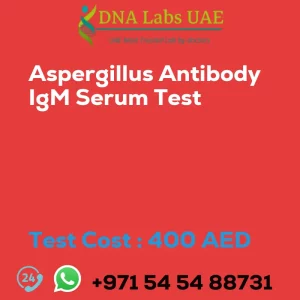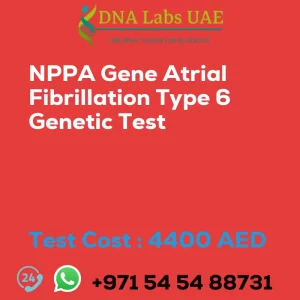ASPERGILLUS ANTIBODIES PANEL IgG and IgM SERUM Test
Test Name: ASPERGILLUS ANTIBODIES PANEL IgG and IgM SERUM Test
Components: Price 750.0 AED
Sample Condition: 2 mL (1 mL min.) serum from 1 SST. Ship refrigerated or frozen.
Report Delivery: SampleWed by 9 am; Report Same day
Method: Enzyme Immunoassay
Test type: Allergy, Disorders of Respiratory system
Doctor: Physician, Chest Physician
Test Department:
Pre Test Information
No special preparation required
Test Details
The Aspergillus Antibodies Panel IgG & IgM Serum test is a diagnostic tool used to detect the presence of antibodies to the Aspergillus fungus in a patient’s blood. Aspergillus is a common type of mold that can cause various infections in humans, particularly in individuals with weakened immune systems.
The test measures both IgG and IgM antibodies, which are two types of antibodies produced by the immune system in response to an Aspergillus infection. IgG antibodies are typically produced later in the infection and can provide long-term immunity, while IgM antibodies are produced earlier in the infection and indicate a more recent or active infection.
This test is commonly used to diagnose and monitor Aspergillus infections, such as invasive aspergillosis, allergic bronchopulmonary aspergillosis, and aspergilloma. It can also be used to assess the effectiveness of treatment and to determine if a patient has developed an immune response to the fungus.
The test involves taking a blood sample from the patient, which is then sent to a laboratory for analysis. Results are usually reported as positive or negative, indicating the presence or absence of Aspergillus antibodies in the blood. A positive result suggests a current or past infection, while a negative result indicates no detectable antibodies and a lack of exposure to the fungus.
It is important to note that a positive result does not necessarily mean that the patient has an active Aspergillus infection, as antibodies can persist in the blood even after the infection has been treated or resolved. Further clinical evaluation and additional tests may be needed to confirm the diagnosis and determine the appropriate course of treatment.
| Test Name | ASPERGILLUS ANTIBODIES PANEL IgG and IgM SERUM Test |
|---|---|
| Components | |
| Price | 750.0 AED |
| Sample Condition | 2 mL (1 mL min.) serum from 1 SST. Ship refrigerated or frozen. |
| Report Delivery | SampleWed by 9 am; Report Same day |
| Method | Enzyme Immunoassay |
| Test type | Allergy, Disorders of Respiratory system |
| Doctor | Physician, Chest Physician |
| Test Department: | |
| Pre Test Information | No special preparation required |
| Test Details |
The Aspergillus Antibodies Panel IgG & IgM Serum test is a diagnostic tool used to detect the presence of antibodies to the Aspergillus fungus in a patient’s blood. Aspergillus is a common type of mold that can cause various infections in humans, particularly in individuals with weakened immune systems. The test measures both IgG and IgM antibodies, which are two types of antibodies produced by the immune system in response to an Aspergillus infection. IgG antibodies are typically produced later in the infection and can provide long-term immunity, while IgM antibodies are produced earlier in the infection and indicate a more recent or active infection. This test is commonly used to diagnose and monitor Aspergillus infections, such as invasive aspergillosis, allergic bronchopulmonary aspergillosis, and aspergilloma. It can also be used to assess the effectiveness of treatment and to determine if a patient has developed an immune response to the fungus. The test involves taking a blood sample from the patient, which is then sent to a laboratory for analysis. Results are usually reported as positive or negative, indicating the presence or absence of Aspergillus antibodies in the blood. A positive result suggests a current or past infection, while a negative result indicates no detectable antibodies and a lack of exposure to the fungus. It is important to note that a positive result does not necessarily mean that the patient has an active Aspergillus infection, as antibodies can persist in the blood even after the infection has been treated or resolved. Further clinical evaluation and additional tests may be needed to confirm the diagnosis and determine the appropriate course of treatment. |







